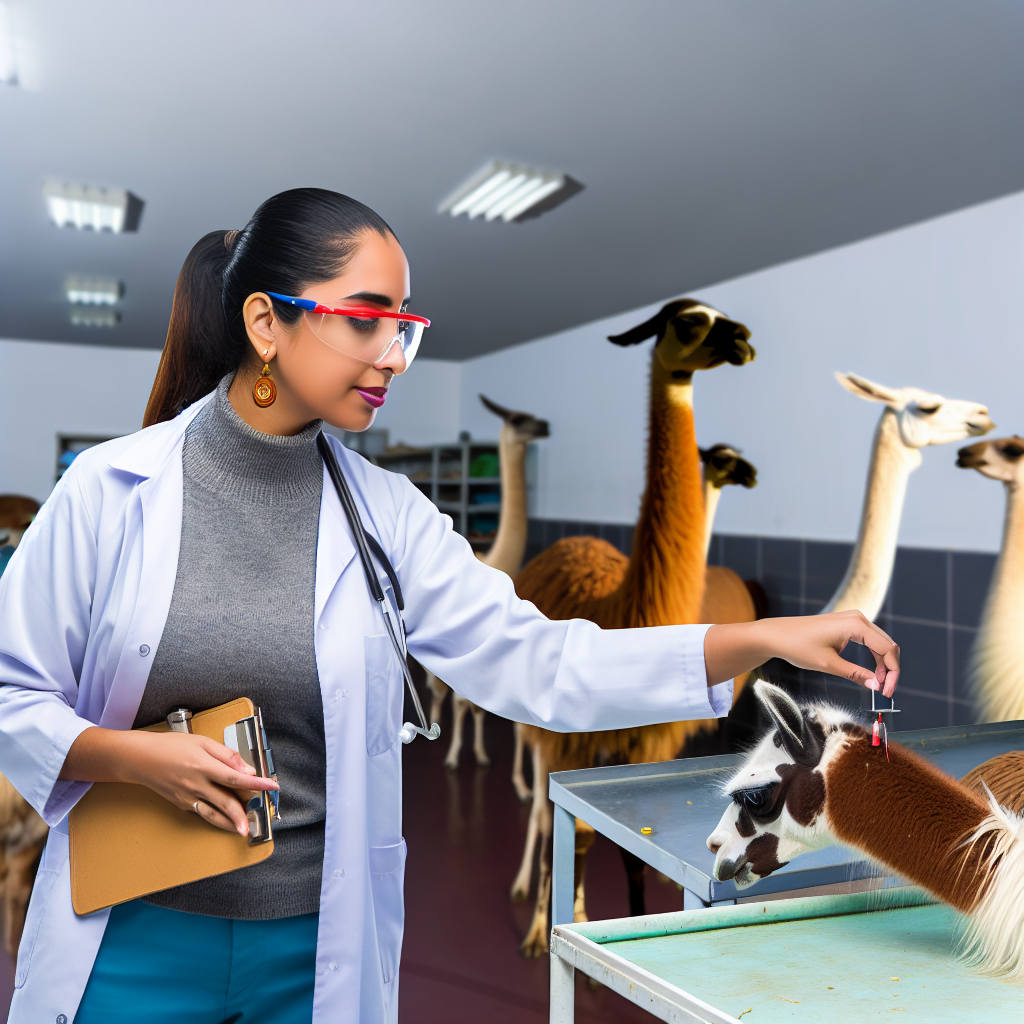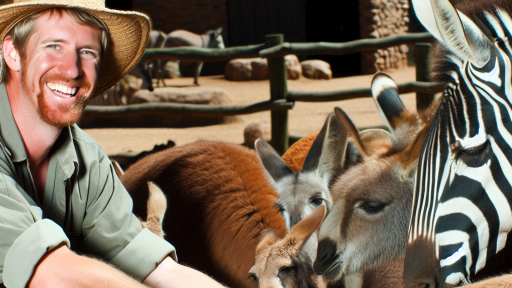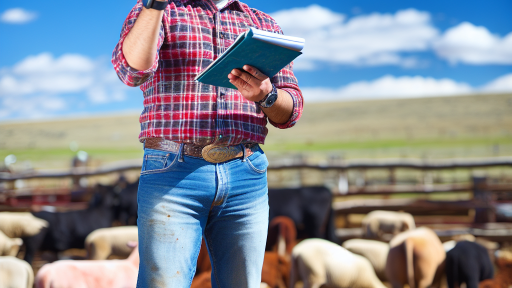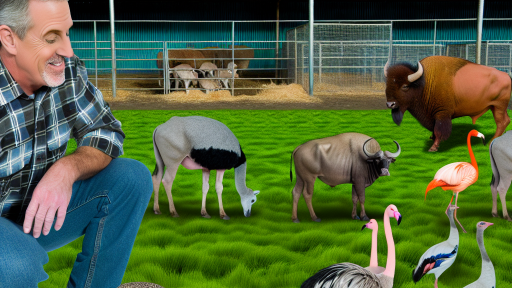Understanding Exotic Livestock
Characteristics of Exotic Livestock
Exotic livestock differ significantly from conventional breeds.
They often possess unique traits that make them appealing to farmers.
Typically, these animals exhibit high adaptability to diverse climates.
Furthermore, exotic species can have distinct behavioral patterns.
These traits may enhance farm productivity and profitability.
Common Diseases Affecting Exotic Livestock
Exotic livestock are susceptible to specific diseases.
For example, they can suffer from respiratory infections.
Parasitic infections also pose a considerable threat.
Additionally, certain exotic species might contract zoonotic diseases.
Being aware of these risks is crucial for effective management.
Preventive Measures for Disease Control
Implementing preventive measures is essential for health maintenance.
Regular health screenings can help identify potential issues early.
Vaccinations also play a critical role in disease prevention.
Moreover, maintaining clean living conditions is vital.
Proper nutrition can enhance their immune systems effectively.
Transform Your Agribusiness
Unlock your farm's potential with expert advice tailored to your needs. Get actionable steps that drive real results.
Get StartedThe Importance of Education and Training
Education significantly impacts the success of exotic livestock management.
Farmers should seek out training programs and resources.
This knowledge empowers them to make informed decisions.
Furthermore, sharing experiences within the farming community can aid learning.
Continuous education ensures awareness of emerging diseases and solutions.
Importance of Biosecurity Measures in Exotic Livestock Farming
Understanding Biosecurity
Biosecurity encompasses a series of preventive measures.
These measures aim to protect livestock from diseases.
Implementing biosecurity is crucial in exotic livestock farming.
This approach helps mitigate various health risks.
Preventing Disease Spread
Exotic livestock are susceptible to numerous diseases.
Some diseases can spread rapidly among animals.
Therefore, preventing disease spread is a top priority.
This requires strict biosecurity protocols.
Regular health checks become essential in this context.
Reducing Economic Loss
Health issues in livestock can lead to financial losses.
Sick animals decrease productivity and may require treatment.
In extreme cases, entire herds may need to be culled.
Effective biosecurity measures minimize these risks.
This ensures a stable and profitable farming operation.
Maintaining Public Health
Diseases in livestock may also affect human health.
Pathogens can transfer from animals to humans.
By enhancing biosecurity, farmers protect public health.
Successful disease prevention supports community well-being.
Building Farmer Confidence
Farmers benefit from reliable biosecurity measures.
Showcase Your Farming Business
Publish your professional farming services profile on our blog for a one-time fee of $200 and reach a dedicated audience of farmers and agribusiness owners.
Publish Your ProfileSuch measures foster confidence in the farming process.
When animals are healthy, farmers are more productive.
Moreover, it enhances the quality of the products offered.
Consistent health standards attract more customers.
Establishing Guidelines and Protocols
Farmers should establish clear biosecurity guidelines.
These guidelines must be tailored to specific types of livestock.
Protocols should include sanitation practices and animal management.
Continual training for farm staff enhances awareness.
Regular evaluation of protocols ensures effectiveness.
Vaccination Protocols
Essential Vaccines for Exotic Species
Vaccination is crucial for the health of exotic livestock.
It prevents diseases that can spread rapidly in these populations.
Understanding essential vaccines ensures optimal protection.
Core Vaccines
Core vaccines are vital for all exotic species.
These vaccines address widespread diseases that pose serious risks.
- Canine Distemper Virus (CDV)
- West Nile Virus (WNV)
- Rabies
Regular vaccination schedules help maintain herd immunity.
Species-Specific Vaccines
Species-specific vaccines cater to the unique needs of various exotic animals.
Consult a veterinarian to determine the best options for your flock.
- Feline Panleukopenia for domestic cats in mixed-species environments.
- Equine Influenza for exotic equids.
- Aviary Polyomavirus for parakeets and similar birds.
These vaccines target diseases endemic to specific species.
Timing and Administration
Administer vaccines at the right time for maximum effectiveness.
Typically, juvenile animals require vaccinations more frequently.
Adult animals may need boosters on a regular schedule.
Always follow the veterinarian’s recommendations.
Monitoring and Record Keeping
Keep accurate records of all vaccinations.
Monitoring health after vaccination helps identify adverse reactions early.
Documentation aids in assessing the effectiveness of your vaccination program.
Sharing health records can also facilitate trade or movement.
Consultation with Veterinary Experts
Regular consultations with veterinary experts enhance vaccination strategies.
They can tailor vaccination protocols to specific herds.
Expertise can address unique challenges faced by exotic livestock owners.
Engaging with specialists ensures compliance with health regulations.
Explore Further: Essential Features Of Modern Livestock Housing
Nutritional Strategies to Enhance Immunity in Exotic Livestock
Importance of Balanced Nutrition
Balanced nutrition is vital for exotic livestock health.
A proper diet strengthens the immune system.
In turn, this reduces the likelihood of disease outbreaks.
Additionally, it supports overall growth and reproduction.
Key Nutrients for Immunity
Several key nutrients play a critical role in enhancing immunity.
Proteins are essential for building antibodies.
Vitamins such as A, C, D, and E bolster immune responses.
Minerals including zinc, selenium, and copper also contribute significantly.
These nutrients should be part of the daily diet.
Showcase Your Farming Business
Publish your professional farming services profile on our blog for a one-time fee of $200 and reach a dedicated audience of farmers and agribusiness owners.
Publish Your ProfileFormulating Rations for Exotic Species
Formulating rations requires careful consideration of species-specific needs.
Consulting with a nutritionist can ensure proper nutrient balance.
Utilizing high-quality ingredients promotes better health outcomes.
For instance, using natural forages can support gut health.
Supplementation Strategies
Supplements can enhance the nutritional profile of the diet.
Probiotics aid in digestive health and nutrient absorption.
Prebiotics improve gut flora, further supporting immunity.
Additionally, omega-3 fatty acids have anti-inflammatory properties.
Regular Monitoring and Adjustments
Routine health assessments are essential for long-term success.
Regular monitoring of body condition can inform dietary adjustments.
Addressing deficiencies early can prevent health issues.
Furthermore, adjustments should reflect changes in environmental conditions.
Integrating Nutritional Strategies into Management Practices
Incorporating nutrition into overall management enhances effectiveness.
Regular feeding schedules reduce stress in livestock.
Providing clean water and proper shelter supports health and activity.
Ultimately, a holistic approach yields better livestock outcomes.
Find Out More: Optimal Feeding Practices for Goats
Regular Health Assessments and Monitoring for Disease Prevention
The Importance of Health Assessments
Regular health assessments are crucial for monitoring livestock well-being.
These assessments help identify health issues early.
Consequently, early detection leads to prompt treatment.
Furthermore, it prevents the spread of diseases within herds.
Frequency of Health Checks
Establishing a routine for health checks is vital.
Monthly assessments can provide consistent health monitoring.
Regular check-ups ensure that any changes are documented.
In addition, frequent assessments allow for preventative measures.
Techniques for Effective Monitoring
Utilizing a combination of observation and testing enhances monitoring effectiveness.
Veterinarians often recommend a checklist for health assessments.
This checklist may include weight measurements, skin condition, and behavior observations.
Moreover, blood tests and vaccinations are essential components of health checks.
Collaborating with Veterinary Professionals
Partnering with a veterinarian ensures comprehensive care for livestock.
Veterinarians can provide expertise in disease prevention protocols.
They can also recommend vaccination schedules and treatment plans.
Additionally, consulting professionals helps keep up with new diseases.
Keeping Detailed Health Records
Maintaining health records is essential for tracking livestock health over time.
These records should include notes on assessments, treatments, and vaccinations.
Having detailed records allows for better decision-making in herds.
It also aids in recognizing patterns that may indicate emerging health issues.
See Related Content: Maintaining Transport Vehicles for Livestock Safety

Environmental Management: Reducing Pathogen Exposure in Exotic Animals
Understanding Pathogen Sources
Pathogens can originate from various sources in exotic animal environments.
Identifying these sources is crucial for effective disease prevention.
Showcase Your Farming Business
Publish your professional farming services profile on our blog for a one-time fee of $200 and reach a dedicated audience of farmers and agribusiness owners.
Publish Your ProfileWildlife interactions often introduce pathogens to domestic livestock.
Additionally, human activity can exacerbate pathogen exposure in exotic animals.
Designing Safe Habitats
Creating a safe habitat helps minimize exposure to harmful pathogens.
Utilize proper fencing to control wildlife entry into exotic animal enclosures.
Design enclosures that allow for natural behaviors while limiting risks.
Moreover, consider materials that are easy to clean and disinfect.
Maintaining Hygiene Standards
Regular cleaning of enclosures is essential in disease prevention.
Establish a routine for waste removal to reduce pathogen load.
Use appropriate disinfectants that target specific pathogens.
In addition, ensure that feeding equipment remains sanitized.
Implementing Biosecurity Practices
Biosecurity practices reduce the risk of disease spread among exotic animals.
Limit access to handling only authorized personnel.
Provide training on biosecurity measures to staff and visitors.
Also, maintain a separate area for new arrivals to monitor their health status.
Monitoring and Surveillance
Regular health checks of exotic animals can catch diseases early.
Implement surveillance programs to track health trends over time.
Use diagnostic tools to identify specific pathogens present in the population.
Furthermore, report any disease outbreaks promptly to mitigate risks.
Cooperation with Experts
Collaboration with veterinary professionals enhances health management efforts.
Seek advice on the latest preventive measures and treatments.
Participate in workshops and training programs offered by experts.
Additionally, share knowledge with other facilities to improve overall practices.
Discover More: Building Secure Facilities for Exotic Animals
Collaboration with Veterinary Professionals for Disease Control
The Importance of Collaboration
Effective disease control requires collaboration among various stakeholders.
Veterinary professionals play a crucial role in this effort.
They bring specialized knowledge to help manage and prevent diseases in exotic livestock.
Collaboration fosters a comprehensive approach to disease prevention.
Establishing Partnerships
Farmers should build strong relationships with veterinary professionals.
Regular consultations are vital for identifying potential health risks.
Moreover, these partnerships can enhance livestock welfare through proactive measures.
Consider organizing workshops and training sessions with veterinary experts.
Such initiatives can educate livestock owners about common diseases and prevention strategies.
Implementing Health Protocols
Developing health protocols is essential for controlling disease outbreaks.
Veterinary professionals should guide the creation of these protocols.
Health protocols may include vaccination schedules and biosecurity measures.
Additionally, regular health assessments can identify issues before they escalate.
Farmers must ensure adherence to established guidelines for maximum effectiveness.
Utilizing Technology
Technology can enhance collaboration between farmers and veterinary professionals.
Veterinary apps can help track health records and vaccination schedules.
Online platforms facilitate real-time communication for quicker responses.
Showcase Your Farming Business
Publish your professional farming services profile on our blog for a one-time fee of $200 and reach a dedicated audience of farmers and agribusiness owners.
Publish Your ProfileUtilizing telemedicine options can bring expert advice directly to remote locations.
Embracing these technologies can streamline disease management efforts.
Continuous Education and Training
Ongoing education is vital for both farmers and veterinary professionals.
Staying updated on the latest research improves disease prevention methods.
Regular training sessions can ensure everyone is informed about emerging threats.
Furthermore, workshops can cover advancements in veterinary medicine.
This shared knowledge base strengthens the overall health of livestock populations.
Educating Farm Workers on Best Practices for Animal Care and Hygiene
Importance of Proper Training
Educating farm workers is essential for disease prevention.
Knowledgeable workers can identify health issues early.
They also know how to maintain proper hygiene standards.
Proper training leads to better overall livestock care.
Core Topics for Training Programs
Training programs should cover several key areas.
- Hygiene protocols for handling animals.
- Recognizing signs of illness in livestock.
- Understanding proper feeding and nutrition practices.
- Administering medications and treatments safely.
Additionally, training should include biosecurity measures.
These practices help mitigate disease spread.
Utilizing Resources for Education
Farmers should use various resources for effective education.
Hosting workshops and seminars can be beneficial.
Online courses offer flexibility for busy schedules.
Moreover, consultation with veterinary professionals is crucial.
Continuous Learning and Updates
Encouraging continuous education keeps workers informed.
Regular updates on new diseases and treatments are vital.
Incorporating feedback from staff can improve training programs.
By fostering a culture of learning, farms stay proactive.




